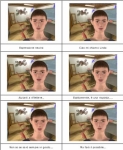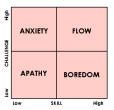Jan 09, 2006
XPod: Emotion-aware mobile music player
A paper by Andor Dornbush, Kevin Fisher, Kyle McKay, Alex Prikhodko, and Zary Segall describe a mobile MP3 player, the Xbox, which is able to automatically select the song best suited to the emotive situation of the user.
Here is an excerpt from the article (I am quoting it from Nicholas' blog Pasta and Vinegar).
the notion of collecting human emotion and activity information from the user, and explore how this information could be used to improve the user experience with mobile music players.
(…)
a mobile MP3 player, XPod, which is able to automate the process of selecting the song best suited to the emotion and the current activity of the user. The XPod concept is based on the idea of automating much of the interaction between the music player and its user.
(…)
After an initial training period, the XPod is able to use its internal algorithms to make an educated selection of the song that would best fit its user’s emotion and situation. We use the data gathered from a streaming version of the BodyMedia SenseWear to detect different levels of user activity and emotion. After determining the state of the user the neural network engine compares the user’s current state, time, and activity levels to past user song preferences matching the existing set of conditions and makes a musical selection. The XPod system was trained to play different music based on the user’s activity level. A simple pattern was used so the state dependant customization could be verified. XPod successfully learned the pattern of listening behavior exhibited by the test user. As the training proceeded the XPod learned the desired behavior and chose music to match the preferences of the test user. XPod automates the process of choosing music best suited for a user’s current activity. The success of the initial implementation of XPod concepts provides the basis for further exploration of human- and emotion-aware mobile music players.
19:55 Posted in Emotional computing | Permalink | Comments (0) | Tags: Positive Technology, experience computing
Dec 23, 2005
Cyberaddiction is increasing
Psychotherapists have begun to experience the emersion of “new addictions.” These new addictions, which are directly connected to our advancing technological environment, have rooted over the past few years and patients experiencing the negative consequences are increasingly presenting for treatment in psychotherapy practices
Learn more about cyberaddiction here
13:45 Posted in Emotional computing | Permalink | Comments (0) | Tags: Positive Technology, experience computing
Oct 21, 2005
The symptoms of computer addiction..
Psychological Symptoms
Having a sense of well-being or euphoria while at the computer
Inability to stop the activity
Craving more and more time at the computer
Neglect of family and friends
Feeling empty, depressed, irritable when not at the computer
Lying to employers and family about activities
Problems with school or job
Physical Symptoms
Carpal tunnel syndrome
Dry eyes
Migraine headaches
Back aches
Eating irregularities, such as skipping meals
Failure to attend to personal hygiene
Sleep disturbances, change in sleep pattern
(According to Maressa Hecht Orack, Ph.D.)
19:35 Posted in Emotional computing | Permalink | Comments (0) | Tags: Positive Technology, experience computing
Jul 25, 2005
Affective computing in healthcare: the project Myself
The EU-funded project Myself focuses on the enrichment of the simulations and the affective computing methodologies traditionally carried out in didactic classroom.
The project's idea is to integrate affective computing into virtual tutors to enhance distance learning and training applications. Affective computing is aimed at giving computers skills of emotional intelligence, including the ability to recognize and express emotions, and to respond to them effectively.
Started in Semptember 2004 and running 24 months, the project gathers industries and research performers from seven European countries (Italy, Spain, United Kingdom, Estonia, Switzerland, Poland, Holland). The project's coordinator is ACSE, an Italian company that supplies information technology services.
 We have interviewed Dr. Fabrizia Mantovani, psychologist, who is working on the research workpackage on Affective Computing for the Center for Studies in Communication Sciences of University Milano-Bicocca, headed by Prof. Luigi Anolli.
We have interviewed Dr. Fabrizia Mantovani, psychologist, who is working on the research workpackage on Affective Computing for the Center for Studies in Communication Sciences of University Milano-Bicocca, headed by Prof. Luigi Anolli.
PTJ - Dr. Mantovani, what are the potential applications of Myself project?
The target application of the project was the development of an e-learning platform endowed with affective computing capabilities (recognition of, and adaptation to, the emotional and motivational states of the users during the learning path). The second objective is development of interactive simulations for the training of communication and emotional skills in professional relationships. In this project, two main target-end users are finance and banking and healthcare professionals.
PTJ - Interesting. But how this approach can be used in healthcare?
The idea is to use 3D-agents based simulations to train physicians and caregivers on how to improve the relationships with patients and their families. Traditionally, soft-skill training is mainly carried out in classroom and face-to-face settings. In Myself, the goal is to use experiential e-learning training to support the acquisition of complex communication and procedural skills (i.e. how to deliver bad health news to the patient, enhance compliance, to be in trust in the relationship etc.), which are useful to improve the relationship between doctors and patients.
More to explore
Affective Computing Portal - a web site devoted to affective computing research
Affective Computing Lab at MIT Medialab - web site of the lab headed by Rosalind Picard
Virtual Reality Lab (VRlab) at the Swiss Federal Institute of Technology - the leading lab for virtual humans research
12:00 Posted in Emotional computing | Permalink | Comments (0) | Tags: Positive Technology, experience computing
Dec 09, 2004
The Experience of Flow
Flow is an optimal experience characterized by:
* a sense of playfulness
* a feeling of being in control
* concentration and highly focused attention
* mental enjoyment of the activity for its own sake
* a distorted sense of time
* a match between the challenge at hand and one's skills
Info and Quotes from Flow: The Psychology of Optimal Experience By Mihaly Csikszentmihalyi:
"Contrary to expectation, "flow" usually happens not during relaxing moments of leisure and entertainment, but rather when we are actively involved in a difficult enterprise, in a task that stretches our mental and physical abilities." - Mihaly Csikszentmihalyi
"People seem to get more flow from what they do on their jobs than from leisure activities in free time." - Mihaly Csikszentmihalyi
It turns out that watching TV is not at all a flowful activity. People generally report higher levels of stress, depression, and tension after watching TV. It seems that TV's main virtue is that it occupies the mind undemandingly. Flow is hard to achieve without effort. Flow is not "wasting time".
"It is by being fully involved with every detail of our lives, whether good or bad, that we find happiness, not by trying to look for it directly. - Mihaly Csikszentmihalyi
"People who learn to control inner experience will be able to determine the quality of their lives, which is as close as any of us can come to being happy." - Mihaly Csikszentmihalyi
"Getting control of life is never easy, and sometimes it can be definitely painful." - Mihaly Csikszentmihalyi
"Since what we experience is reality, as far as we are concerned, we can transform reality to the extent that we influence what happens in consciousness and thus free ourselves from the threats and blandishments of the outside world." - Mihaly Csikszentmihalyi
20:00 Posted in Emotional computing | Permalink | Comments (0) | Tags: Positive Technology, experience computing








